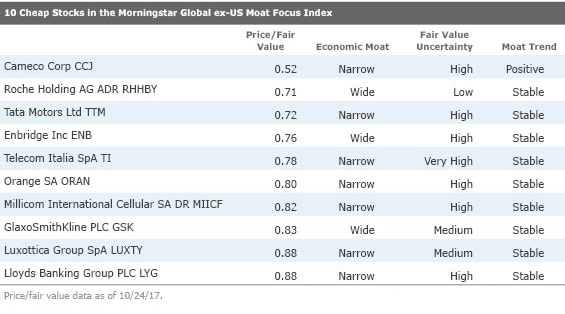10 Cheap Foreign Stocks With Moats
For investors looking abroad, these high-quality stocks are selling at compelling valuations.
There are many compelling reasons to venture abroad when it comes to your portfolio. Not only can foreign stocks provide valuable diversification for a U.S.-heavy portfolio, there is a case to be made that foreign stocks may be less overvalued than U.S. stocks, which have gained more than 15% per year for the trailing five years through Oct. 26.
Meanwhile, the Morningstar Global Markets ex-US Index has returned a little less than half of that amount. True, some of the underperformance is due to currency effects. But for bargain-hunters who want to look abroad, the Morningstar Global ex-US Moat Focus Index can help you find high-quality bargains in developed and emerging markets.
The Global ex-US Moat Focus Index follows the same philosophy as the well-known Morningstar Wide Moat Focus Index, which targets attractively valued, high-quality stocks. And like the Wide Moat Focus, the Global ex-US Moat Focus is pretty straightforward. First, we look at the Morningstar Global Markets ex-US Index, which is a broad index representing 97% of developed (ex-US) and emerging-markets market capitalization. From there, we rank by lowest price/fair value to find the 50 cheapest wide- and narrow-moat stocks (meaning we think they have advantages that will fend off competitors for at least a decade). These 50 stocks represent the most compelling values among the global moat universe, according to Morningstar analysts.
It should be noted that the Global ex-US Moat Focus Index, which is intended as an investment strategy and is licensed for investable products, invests in securities in their local currencies, on their local exchanges. We searched for undervalued stocks in the index that are available to U.S. investors through American depositary receipts (which allows a certain number of shares of a non-U.S. company to be traded on a U.S. exchange).
Below, we list 10 stocks that are selling at compelling valuations, and then we take a closer look at three undervalued firms.

We view Orange as one of the primary beneficiaries of the movement to converged services (in other words, the merging of the traditional triple play of fixed-line telephony, broadband, and pay television with wireless telephony). Convergence leads to lower churn and more-valuable customers, says senior equity analyst Allan Nichols; when this is combined with 4G and fibre, which help to differentiate networks, Nichols thinks Orange is well positioned for the macroeconomic trends hitting European communication markets. The company plans to increase its capital expenditures over the next three years to speed up its build-out of 4G (on the wireless side) and fibre (on the fixed-line and broadband side). Nichols thinks this investment will once again establish Orange as the French operator with the best network in both wireless and fixed-line services, thereby strengthening its economic moat.
The majority of Orange's narrow economic moat resides in its dominant positions in France and Poland, where it is the incumbent telecom operator, Nichols said. Orange still has about 62% of the fixed-line market in France and more than 74% in Poland; in broadband access, it has about 40% of the market in France and 31% in Poland; in wireless, it has about 34% in France and 27% in Poland.
As one of the largest pharmaceutical companies, GlaxoSmithKline has used its vast resources to create the next generation of healthcare treatments. The company's innovative new product lineup and expansive list of patent-protected drugs create a wide economic moat, says sector director Damien Conover. Glaxo's patent-protected drugs carry strong pricing power, which enables the firm to generate returns on invested capital in excess of its cost of capital, Conover said.
Glaxo's patents give the company time to develop the next generation of drugs before generic competition arises. Take Advair, the company's largest drug, for example: While Glaxo holds a diversified product portfolio (spanning several therapeutic classes as well as vaccines and consumer goods), there is some product concentration with Advair, which represents over 10% of GlaxoSmithKline's total sales. But generic competition is likely to be slower for this drug, given the complexity of creating generic respiratory drugs. And further, Glaxo's new product launches will likely mitigate the impact of eventual generic competition for Advair.
Luxottica is merging with French eyewear company Essilor, and we expect the merger to close by the end of 2017. Therefore, we derive our fair value estimate for Luxottica from our combined EssilorLuxottica model and believe the combined firm possesses a wide economic moat. (Luxottica on its own is narrow-moat rated, and Essilor is wide-moat rated.)
Luxottica, which owns famous brands such as Oakley, Ray-Ban, and Oliver Peoples, is the world's largest designer, producer, and retailer of sun and prescription eyewear. Equity analyst Jelena Sokolova believes Luxottica's moat stems from its significant scale advantage and its unmatched distribution network, which, combined with efficient inventory management, give the firm a cost advantage as well as a barrier that protects it from competing firms. Further, Sokolova thinks long-run growth prospects for the global eyewear business are positive. Premium sunglasses are underpenetrated in the United States compared with Europe, she said. Further, the company acquired a provider of vision-care plans and now is also one of the largest managed vision-care operators through EyeMed.
Disclosure: Morningstar, Inc. licenses indexes to financial institutions as the tracking indexes for investable products, such as exchange-traded funds, sponsored by the financial institution. The license fee for such use is paid by the sponsoring financial institution based mainly on the total assets of the investable product. Please click here for a list of investable products that track or have tracked a Morningstar index. Neither Morningstar, Inc. nor its investment management division markets, sells, or makes any representations regarding the advisability of investing in any investable product that tracks a Morningstar index.

/s3.amazonaws.com/arc-authors/morningstar/3a6abec7-a233-42a7-bcb0-b2efd54d751d.jpg)
/cloudfront-us-east-1.images.arcpublishing.com/morningstar/LDGHWJAL2NFZJBVDHSFFNEULHE.jpg)
/cloudfront-us-east-1.images.arcpublishing.com/morningstar/F2S5UYTO5JG4FOO3S7LPAAIGO4.jpg)
/cloudfront-us-east-1.images.arcpublishing.com/morningstar/ZZNBDLNQHFDQ7GTK5NKTVHJYWA.jpg)
:quality(80)/s3.amazonaws.com/arc-authors/morningstar/3a6abec7-a233-42a7-bcb0-b2efd54d751d.jpg)